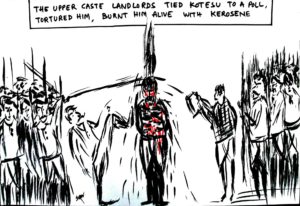Kalekuri Prasad
Wasn’t it your footprints
That I bore on my heart
Even as death approached, didn’t I seek life with only you?
Beloved, with the rice mixed with curd
That you served me in the morning as my witness
Shall I tell you the cause of my death?
‘Beloved’! To call you that
How the language of our hearts’ blood struggled!
Even as our bodies enveloped each other
In the dark
I could only call you ‘Mistress’
My wish was never fulfilled until death
Even as your folks tied me to a tree
And beat me like I was a beast
I imagined I was a prince in a swashbuckler film
If someone had asked, what happened?
I wanted to say that I loved you
But the raccabanda* had charged me with being a thief
Weren’t you the witness!
I know how to burn dead bodies
But you burnt me alive
"Father, forgive them,
for they do not know what they are doing"
I remembered what the padre told me
About our lord’s plea.
In remembrance of the sleepless nights we had spent together
If even a single tear drop had glistened in your eyes
I would have forgiven you and your race
The furnace you had stoked in my heart
The flames from the kerosene your folks poured over me
If asked, which hurt more
I can’t say anything, love
As these flames engulf me
It feels like you’re embracing me.
~
This untitled poem by Kalekuri Prasad was translated from Telugu by Naren Bedide. The lynching of Kanchikacherla Kotesu for his love of an upper caste woman is illustrated in a series of drawings by Syam Cartoonist. Please see his album titled The Untouchable Love .
* The village bench, where the elders hold council.
